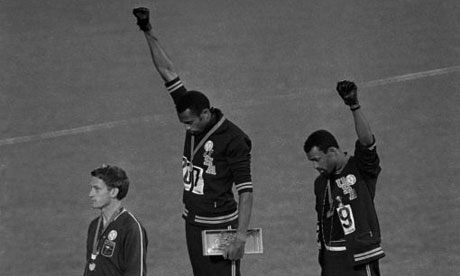 Several years ago while facilitating a leadership course, I had the privilege to meet and converse at length with former United States Track & Field sprinter and 1968 Olympic Bronze Medalist John Carlos. You may remember well the lasting image of John, his teammate Tommie Smith (Gold Medalist), and Australian Peter Norman (Silver), as the three men stood upon the medal platform following their 200-meter race in Mexico City in 1968.
Several years ago while facilitating a leadership course, I had the privilege to meet and converse at length with former United States Track & Field sprinter and 1968 Olympic Bronze Medalist John Carlos. You may remember well the lasting image of John, his teammate Tommie Smith (Gold Medalist), and Australian Peter Norman (Silver), as the three men stood upon the medal platform following their 200-meter race in Mexico City in 1968.
As John and I spoke about that day, and that moment, I was in awe of the sense of conviction for which he described his decision to join Tommie Smith in such an outward statement in order to bring greater attention to African-American poverty in the United States at that time.
Moreover, I was profoundly impressed by the change John Carlos had already brought about before the 1968 Olympic Games had even begun.
Through his effort that came to be known as the ‘Olympic Project for Human Rights’ (”OPHR”), this medal ceremony would be the lasting impression John Carlos would provide. The protest demonstrated by John and Tommie Smith was actually the final—and certainly most powerful—piece of a series of actions that John had sought leading up to the games. And although some requests made by OPHR prior to those Olympic Games were not met by the International Olympic Committee, one significant request was: The invitations to the countries of South America and Rhodesia were withdrawn by the IOC, and those countries did not appear in the 1968 Games.
John Carlos’ vision of this higher goal was focused upon where he understood he could make a difference. In this role, John saw that he had both an opportunity to bring more attention and opportunity to act to the issue of those in greatest need, and a responsibility to use his own opportunity for a much more worthy purpose.
Many years later, this concept was presented in a highly insightful form through Ira Chaleff’s book, The Courageous Follower. In that book, Chaleff outlined seven core forms of courage that a partner-follower within an organization must possess in order to truly advance the organization. Chaleff emphasized this by stating:
“Courage is the great balancer of power in relationships. An individual, who is not afraid to speak and act on the truth as she perceives it, despite external inequities in a relationship, is a force to be reckoned with.”
Most specifically, John Carlos chose to demonstrate the courage to challenge; a willingness to voice concern when a leader’s or group’s behaviors or policies conflict with the follower’s sense of what is right. John Carlos recognized a time and venue for him to voice his concerns regarding the insufficiencies of his organization—his country—in seeking remedies to the poor. And in a very rare instance, John Carlos chose to challenge his organization at the precise moment of the very pinnacle of his athletic career.
To achieve this level of commitment to the purpose of the organization, each of us must pursue two actions continually: First, it is important that each member of the organization remain equally committed to actively demonstrating their highest values and see that the organization demonstrates its values as well. Secondly, it is important that we continually assess the values we and the organization each hold, and make certain that they remain in alignment. Should these values one day become different, it is important to swiftly understand how and why these differences or changes have occurred, and then recommit ourselves to the higher of those.
For most of us, the responsibility to challenge our organizations is likely not to hold the potential for the intensity, diversity and volume of reactions that John Carlos and Tommie Smith experienced. It is however no less important for us as individuals to show our genuine commitment to our respective organizations. And to fully commit ourselves to our organizations, we must possess and call upon our courage to challenge our organizations to make sure the highest goals we share with our organizations are being achieved.



